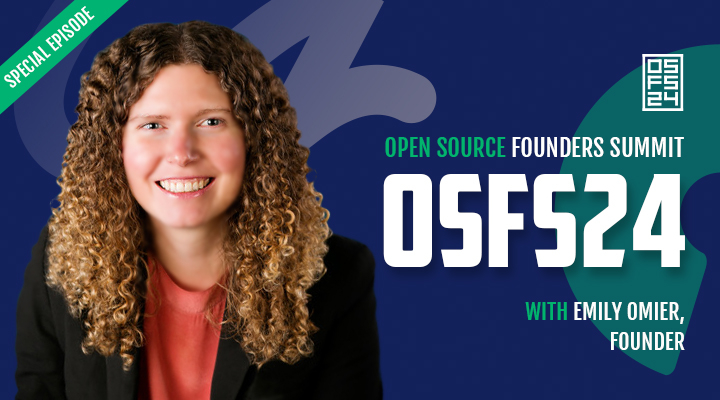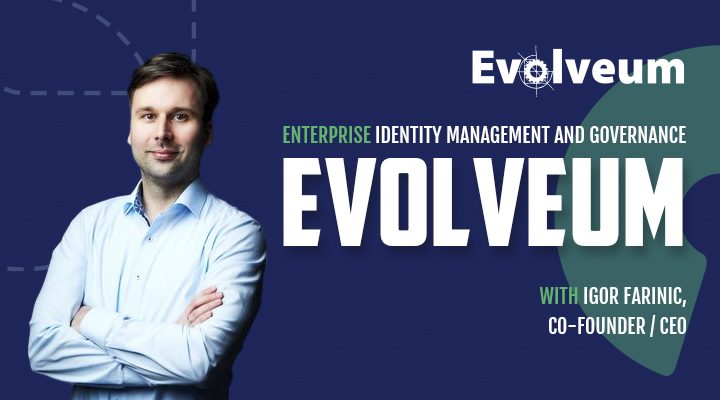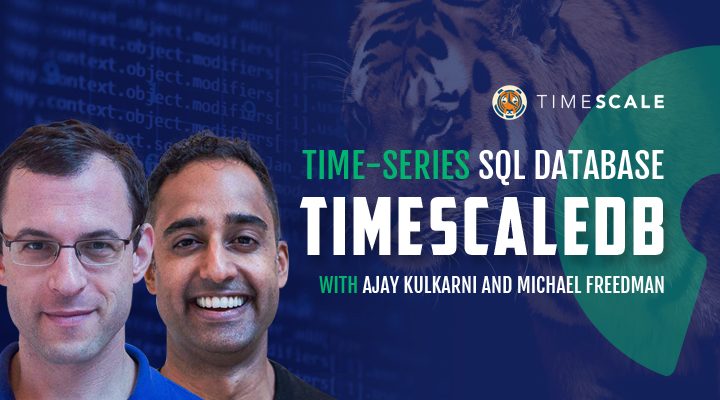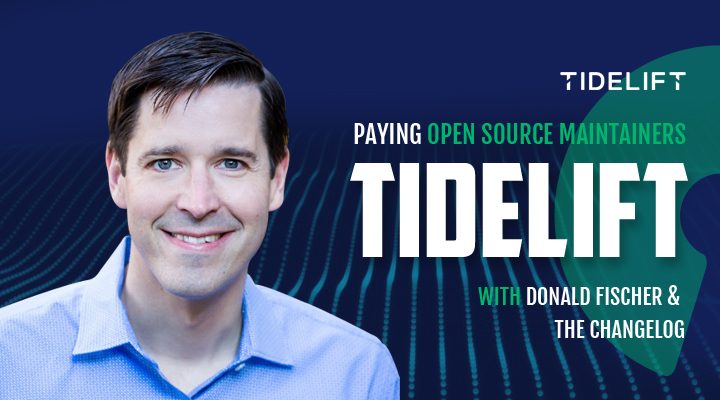
Episode 66: Open Source Founders Summit 05f524, with Emily Omier, Founder
Podcast: Play in new window | Download
Subscribe: RSS
OSFS Website: https://05f5.com/
Intro
Michael: Hello and welcome to Open Source Underdogs! I’m your host Mike Schwartz, and this is a special episode to promote the inaugural Open Source Founder Summit, which is happening in Paris, May 27th and 28th.
Talking about this event is Emily Omier, host of The Business of Open Source Podcast, and along with Luxembourg Passbolt, is providing the initial activation energy to get this new institution of open-source entrepreneurial collaboration off the ground.
If you haven’t heard of Emily’s podcast, you should add the Business of Open Source to your favorites’ list right now. She’s recorded more than 200 episodes in the last 4 years. So, if you listen to all of them, I guarantee you’ll be much more prepared for your start-up journey.
Why Launch the Open Source Founders Summit?
Mike: Okay. Here’s the interview with Emily, so she can fill you in on the rest of the detail and why she’s interested in doing all this work to make this event happen. Emily, thank you so much for joining us on Open Source Underdogs today.
Emily: You’re welcome. Thank you so much for having me, Mike.
Mike: The reason I thought this would be a good idea is because I heard that you’re organizing a new conference. Maybe you can tell us a little bit about why you’re doing this?
Emily: Yeah, that’s an excellent question. So, the conference is called Open Source Founder Summit, and we can also have a long argument about semantics about whether it’s a conference, or a summit, or whatever it is.
A retreat, the rationale, or the motivation behind this event is several fold. I am a positioning consultant for open-source companies. I go to a lot of open-source conferences of all kinds, including actually a couple that are focused on business. And I always felt that there wasn’t any events that sort of represented the entire breadth of open-source businesses.
So, there was actually a specific conversation that I had with somebody before the Heavybit DevGuild’s conference focused on open source last May, and in this conversation, this other person was talking about how there’s no unicorn open-source companies in mainland Europe.
And I said, “Well, what about Odoo?”, which people don’t know about it is an open-source company that’s based in Belgium, that has 2000 employees around, and in fact, actually does have a $2-billion valuation. But anyway, this person I was talking to was like, “Oh, no, no, Odoo is a unicorn.” I actually didn’t have the numbers there with me, so I was like, “Okay, whatever. I’m not sure.” I didn’t argue back.
But it got me thinking about the fact that Odoo, which you may have noticed, is like one of my favorite open source-companies success stories – it’s totally left out of a lot of these conversations because a) they’re in Belgium, which is like fabulously uncool, it’s like as far away from the tech centers as possible. Maybe not quite, but it’s like, they’re in Europe, and they’re not even in Berlin or London – they’re in Belgium.
They’re not Dev tools, they make business applications, or like an open-source SAP, and so because they’re not Dev tools, they’re left out of a lot of the conversations about open source.
They didn’t go public, they did get some venture backing, but most of it was a while ago. They’re a profitable company. Basically, like they’re a company that I think most founders would consider a massive success, and yet, sort of left out of the conversation.
I was feeling like a lot of non-Dev tool open-source companies were left out of the conversation, a lot of non-venture-backed open-source companies were left out of the conversation, and it just seemed like there should be a place to get open-source founders together that was going to represent sort of all the different voices of open-source companies.
I’m going to add one more thing, which is, that, in general, I think a lot of conference talks are not super actionable, and I wanted to create a conference that was going to have content that was really actionable for people.
What is the format?
Mike: I was thinking about this last night, and I was wondering what the format is going to be. Because almost all the founders could probably be speakers. So, what do you envision the format to be, and how do you see this differing from, for example, I interviewed Joe Jacks a couple of years back, when he started, or launched the Open Core Summit – how do you see it being different? And what do you think the format’s going to look like?
Emily: First of all, this is a small event, so, maybe 6 years from now, this will be a bigger event – we’ll see. But we have a maximum of 100 people. So, that, in and of itself, is a different format from a lot of events, but we do have a couple of speakers, we have 10 that we’ve reached out to and are sort of the main speakers in the mornings.
But there’s also going to be lightning talks and breakout workshops. And the hope is that everybody who wants to do either a lightning talk, or to moderate a workshop, a breakout workshop, will be able to do so.
Another thing that’s different about this conference is that it’s invite-only, it’s curated. You can request an invite, BUT that means that only people that we, the organizers, feel like have something to contribute to the conversation are going to even be in the room. And this, I think, is very different from a lot of conferences where anybody can buy a ticket and show up.
Why Paris?
Mike: We didn’t mention the dates. I believe it’s the last week in May, in Paris, but maybe you can tell us a little bit about why Paris, and how’s the weather in May in Paris?
Emily: The dates are May 27th and 28th. I am an American and I do live in Paris, so yes, part of why it’s in Paris is because it’s convenient for me. I am organizing this conference with somebody else – his name is Remi Bertot, he is the founder and CTO of Passbolt, which is a security-first open-source password manager.
They are based in Luxembourg, so Paris isn’t terribly inconvenient for him either, but I actually think doing this conference in Europe is also just in and of itself a good idea. Or I will say, particularly not in Silicon Valley.
I feel like part of the goal is really to create community among open-source founders and have this broader conversation. If you are a founder and you live in San Francisco, it’s much easier to find community and to know other open-source founders, whereas if you live even in a place like London or Berlin, it’s actually quite a bit harder to find that community.
And one of the goals here is to create community among open-source founders. And I should mention that our real hope is that this isn’t just a one-off event, but that it sort of becomes something that’s both an annual event that happens every year, but also that there’s sort of a community that brings people together throughout the entire year.
So, yeah, I think having it in Europe as a way to, again, bring more types of open-source companies, who don’t fit the mold of just like your standard Dev tool venture-backed Silicon Valley company, I think it makes a lot of sense.
Mike: And the food’s going to be really good.
Emily: I didn’t talk about the weather. The weather is usually quite good in Paris in May. Bring your spouse, bring your spouse!
Who can attend?
Mike: Yes, that could be one of the selling points. And a quick pitch. I heard you mention that Remi from Passbolt is going to help you organize this, and Kevin Muller from Passbolt, we’re arranging for him to be on The Underdogs podcast. So, sometime in the next month or so.
That’s another great company that people don’t know, all the time based in Europe in the security space. If you’re not a founder, is there any room for non-founder who else might want to attend this event?
Emily: Yeah. If you’re in a leadership role at an open-source company, you should come. We are calling it Open Source Founder Summit, but basically, if you lead marketing at an open-source company, you lead product at an open-source company. Even if you’re not a founder, this is like a place for you to be.
I just didn’t want it to be like 50% investors, for example, or 50% people who are going to be trying to sell to the founders. You don’t have to just be a founder, we do vet people, so you can’t just go to the website and buy a ticket – you might have to make a case. But, like I said, if you’re in a leadership role, it’s just going to be me, sending you an email with the ticket link.
Takeaways from Podcast
Mike: Some of my listeners might not know that you host a podcast called The Business of Open Source has more than 200 episodes, which is amazing. Can you tell me a little bit about the podcast and sort of your journey with a podcast, what you’ve learned along the way?
Emily: Yeah, sure. I do host the Business of Open Source, I take a pretty broad mandate on talking about the business of open source. So, I talked to founders, but not only founders, I also talked to other people in leadership roles, I talked to investors, I like to talk sometimes to big companies, and there’s actually some interesting things that I’ve learned from having so many conversations with people.
Actually, I think that this is one of the reasons why I’m so excited about having like a slightly wider lens on open-source companies.
First of all, I think there’s more business models for open-source companies and people sort of realize it a lot of times. I almost feel like we talk about open core and SaaS as if they’re the only options, but they’re not. And I think that it’s really interesting to talk with people who are trying to sort of novel ways to monetize open source.
Another takeaway I have is that it’s really good to sell to the government. If you’re an open-source company, governments really like transparency and being able to run their code on-prem, or run their software on-prem and stuff. So, that’s definitely a takeaway.
Some other takeaways — I actually did a talk about this at OpenCore Summit in December — another takeaway that I have is that open-source companies can be really hard mind games. Not just for founders. I think this is really underappreciated actually. Because it can be really hard to hire people who have experience with open-source companies.
If you’re starting an open-source company yourself, you hire a salesperson for example, and that salesperson has never worked in an open-source company, doesn’t really know what process is like.
And it’s different, and they’re going to have more of a learning curve than they expected, and there’s going to be all this weird stuff about like losing deals to your own open-source project that’s going to mess with their head. And it’s just something to be aware of, I think. If you’re running an open-source company, think about, is this a mind game for yourself, but also what about the team.
Still Learning after 200 episodes?
Mike: So, along the way from doing this podcast, what I’ve discovered from doing my own podcasts is that open source is way more nuanced than I thought it was. And did you think you knew a lot going into the podcast about open source, and have you been surprised, and are you still discovering new stuff even after 200 episodes?
Emily: I did not think that I knew a lot about open source when I went into the podcast. I mean, I’m constantly surprised. Sometimes by really dumb stuff, like, somebody mentions a project, and I haven’t heard of it, and later you are like, how the hell did I not hear about this. Like, you really feel like an idiot. That still happens to me. Stuff just like ideas, or concepts, that haven’t come up before. Yeah, I’m always learning. And I would say this, sometimes people have asked me, “What’s your secret for staying up to date?”, or whatever. It’s like the secret is the podcast. I do really enjoy doing the podcasts, and I learn a lot from it.
Focus of Consulting?
Mike: Okay, maybe one last question. Because I think you said you are an open-source positioning consultant, can you tell us a little bit about exactly how you help companies, like what does your consulting work revolve around?
Emily: That’s a really good question. I am a positioning consultant, and I work with open-source companies. And fundamentally, a lot of my work revolves around helping companies a) figure out how to place their entire company in the marketplace and b) figuring out how to manage the relationship between their product and their project. Both things are really critical.
So, a lot of people think about positioning, and they think about marketing. This is actually false, so positioning is fundamentally about understanding your place in the ecosystem you’re working in, even which ecosystem you want to be playing in, and then, understanding the differentiated values of your project and of your product, understanding the difference between the two.
And that is going to have cascading effects through your product roadmap, your project roadmap, your whatever marketing you’re doing for each of those things, and whatever you’re doing for sales for those three things.
So, I think of product sales and marketing as like the pillars of go-to-market, and that’s what I help companies figure out. But because I specialize in open-source companies, it’s largely about being really clear on the nuance difference between project and product.
Final Thoughts
Mike: A lot of people don’t know that the reason I started this podcast was to help other founders not make the mistakes that I made in starting my open source, and getting a lot of the things that you’re talking about confused, or not positioning well. So, I think there’s a lot to learn. I would encourage everyone to think about attending this conference. And with that, Emily, any last words you want to add?
Emily: Come to the conference May 27 – 28. If you want to lead a lightning talk or moderate a workshop, we need to know by March 15th. You still have to buy a ticket if you do so. Because, again, everyone who’s coming, has something to contribute, and we actually hope everybody is either doing a talk or leading a workshop. But we have to have a schedule in place, and it takes some time to do that.
Anyway, we want to know by March 15th if you’re interested in doing that. But, yes, come – Paris is beautiful in May. The event I think is going to be really awesome. There is nothing like it anywhere in the world, so come.
Closing
Mike: Emily, thank you so much for sharing all this info. Best of luck. And I wish I could be there, but I’ll certainly be following online.
Emily: Excellent. Thank you, Mike.
Mike: The website is 05f5.com. May 27th and 28th, in Paris.
If you’re an open-source leader, it’s a great opportunity to learn from and with your peers and have epic bragging rights about being at the first Open Source Founder Summit.
Cool graphics from Kamal Bhattacharjee. Music from Broke For Free, Chris Zabriskie and Lee Rosevere.
Next week, Peter Farkas, Co-founder and CEO of FerretDB. Until then, thanks for listening.




